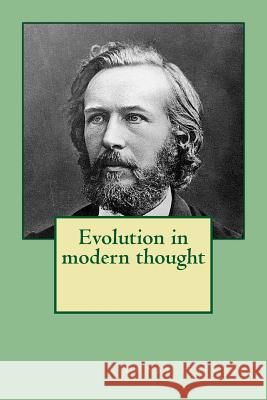Evolution in modern thought » książka
Evolution in modern thought
ISBN-13: 9781518720987 / Angielski / Miękka / 2015 / 378 str.
Ernst Heinrich Philipp August Haeckel (Potsdam, February 16, 1834 - Jena, August 8, 1919), was a biologist, philosopher and German free thinker. He made known the theories of Charles Darwin in Germany and developed a theory of human origins. Haeckel was a physician and professor of comparative anatomy and was one of the first scientists who understood the psychology as a branch of physiology. He also participated in introducing some concepts of modern biology such as those of "branch" or "ecology." Haeckel also pointed to the policy as applied biology. He sketched on science ideology, Weltanschauung of monism and founded January 11, 1906 the Deutscher Monistenbund (monistic German law) in Jena. Ernst Haeckel contributed much through his writings to the dissemination of the theory of evolution. He is considered a pioneer of eugenics, although he has had himself no eugenic design because it escomptait, confident in the progress due to changes greater development and no "degeneration." Like other freethinkers organizations, union-tier German was banned in 1933 by the Nazis. Nazi ideologues used excerpts from his writings as justification for their racist theories of social Darwinism, but at the same time declared that the essential elements of the worldview of Haeckel were inconsistent with the views of National Socialism. Resume As an epoch-marking contribution to Natural History in the widest sense, we rank the picture which Darwin gave to the world of the web of life, that is to say, of the inter-relations and linkages in Nature. For the Biology of the individual--if that be not a contradiction in terms--no idea is more fundamental than that of the correlation of organs, but Darwin's most characteristic contribution was not less fundamental, --it was the idea of the correlation of organisms."
Zawartość książki może nie spełniać oczekiwań – reklamacje nie obejmują treści, która mogła nie być redakcyjnie ani merytorycznie opracowana.











